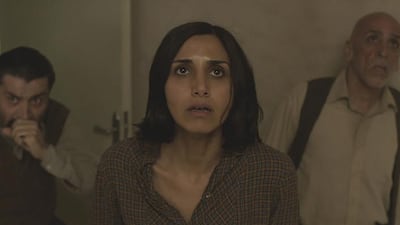Under the Shadow
Director: Babak Anvari
Stars: Narges Rashidi, Bobby Naderi, Avin Manshadi
Four and a half stars
It's been quite a year for Under the Shadow's British-Iranian director Babak Anvari since The National caught up with him at the film's world premiere at the Sundance Festival in January.
The Iran-set horror movie has been critically lauded wherever it has screened, garnering a 98 per cent “certified fresh” rating on review aggregation site Rotten Tomatoes. It won the Best Movie prize at the Neuchâtel International Fantastic Film Festival, and opened the Film Society of Lincoln Centre’s New Directors/New Films 2016 programme at New York’s Museum of Modern Art in March.
Netflix has bought the global streaming rights, there was a limited cinema release in the United States this month, and an English-language remake is in the works, with Anvari on board as executive producer.
It all adds up to an incredible achievement, commercially and politically, for a Farsi-language film.
This weekend, UAE audiences get the chance to see what all the fuss is about.
Set in war-torn Tehran in the in the 1980s – at the height of the war between Iran and Iraq – the film sets up the audience to expect a social commentary on political, gender and social issues – only to (literally) drop a bombshell.
Married mum-of-one Shideh (played by Narges Rashidi) has been blacklisted and prevented from continuing her medical studies thanks to her involvement with radical left-wing groups in the pre-revolutionary days.
Her husband, Iraj (Bobby Naderi), a doctor, is less-than supportive, criticising her desire to complete her studies and her care for their daughter, Dorsa (Avin Manshadi).
The film is shaping up to be a decent social drama, with a nice line in humour, when it almost imperceptibly starts to shift into horror.
Iraj is sent to tend to troops on the front lines, leaving Shideh to care for their daughter alone. As the Iraqi bombardment of Tehran intensifies, strange things start to happen. Objects disappear, strange noises are heard and evil spirits – djinn – are mentioned in hushed tones.
When an unexploded missile rips through the roof of Shideh’s block of flats, it starts to look like it might have brought a djinn with it. Or is it all in Shideh’s mind?
The shift in tone might have been a bit jarring but this is no From Dusk Till Dawn-style two-genres-for-the-price-of-one affair. The change is gradual and seamless.
Gently haunting images of children playing in a war-ravaged courtyard mirror the possible haunting taking place upstairs. Frequent air raids give a looming sense of doom long before any apparitions appear. The gradual disappearance of Shideh’s neighbours as they flee the fighting builds an increasing sense of isolation and helplessness as the film moves towards its climax.
When that comes, Anvari takes no prisoners. The closing act is more akin to a ride on a particularly ferocious ghost train than a traditional Hollywood horror movie. This is a genre that tends to adhere to a very specific rhythm – a jump, a lull, a final confrontation and then a wide-angle shot of the scene after the horror.
Anvari is having none of this. As the previously rational Shideh begins to believe that something is haunting her flat and child, the tempo and the scares are relentless.
While early shocks are met with appreciative giggles from the audience, these become genuine shrieks as Shideh’s ordeal intensifies.
• Under the Shadow is at selected Vox Cinemas on Thursday, November 3

